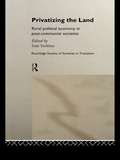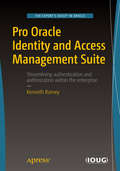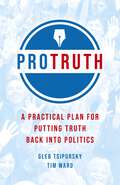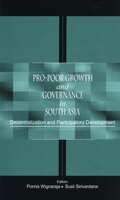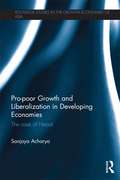- Table View
- List View
Privatizing China: Inside China's Stock Markets
by Fraser J. HowiePRIVATIZING CHINA INSIDE CHINA'S STOCK MARKETS In more depth than any other, this highly readable book lays bare why China's capital markets have fallen so far short of their promise. It is required reading for anyone seeking to understand the realities and the future of an extraordinary economic transformation. - James Kynge, Former Beijing Bureau Chief, Financial Times, Author, China Shakes the World Carl Walter and Fraser Howie bring together a wealth of experience to this complex and deeply important topic. Their book contains a mine of invaluable quantitative and qualitative information as well as an incredible depth of knowledge. It is essential reading for anyone investing in companies from mainland China. - Professor Peter Nolan, Judge Institute of Management Studies, University of Cambridge Privatizing China is essential for anyone who wants to understand China's companies and stock markets. no one should invest in China without reading it. - Arthur Kroeber, Managing Editor, China Economic Quarterly Carl Walter and Fraser Howie combine a deep knowledge of China and finance to provide an unflinching perspective on the country's effort to build functioning capital markets. China may have wowed the world with its high-speed economic growth and manufacturing prowess, but this book is compelling evidence that Beijing's mastery of the universe does not yet extend to the stock market. - Richard MacGregor, beijing Correspodent, FinancialTimes This book will answer many people's questions regarding SOEs and the stock market. I think it is destined to become the standard reference work on the subject. - Jean C. Oi, Director, Center for East Asian Studies, Stanford University
Privatizing China: Socialism from Afar
by Aihwa Ong Li ZhangEveryday life in China is increasingly shaped by a novel mix of neoliberal and socialist elements, of individual choices and state objectives. This combination of self-determination and socialism from afar has incited profound changes in the ways individuals think and act in different spheres of society. Covering a vast range of daily life--from homeowner organizations and the users of Internet cafes to self-directed professionals and informed consumers--the essays in Privatizing China create a compelling picture of the burgeoning awareness of self-governing within the postsocialist context. The introduction by Aihwa Ong and Li Zhang presents assemblage as a concept for studying China as a unique postsocialist society created through interactions with global forms. The authors conduct their ethnographic fieldwork in a spectrum of domains--family, community, real estate, business, taxation, politics, labor, health, professions, religion, and consumption--that are infiltrated by new techniques of the self and yet also regulated by broader socialist norms. Privatizing China gives readers a grounded, fine-grained intimacy with the variety and complexity of everyday conduct in China's turbulent transformation.
Privatizing Peace: How Commerce Can Reduce Conflict in Space
by Wendy N. Whitman CobbThis book explores the privatization of space and its global impact on the future of commerce, peace and conflict. As space becomes more congested, contested, and competitive in the government and the private arenas, the talk around space research moves past NASA’s monopoly on academic and cultural imaginations to discuss how Elon Musk’s SpaceX and Jeff Bezos’ Blue Origin is making space "cool" again. This volume addresses the new rhetoric of space race and weaponization, with a focus on how the costs of potential conflict in space would discourage open conflict and enable global cooperation. It highlights the increasing dependence of the global economy on space research, its democratization, plunging costs of access, and growing economic potential of space-based assets. Thoughtful, nuanced, well-documented, this book is a must read for scholars and researchers of science and technology studies, space studies, political studies, sociology, environmental studies, and political economy. It will also be of much interest to policymakers, bureaucrats, think tanks, as well as the interested general reader looking for fresh perspectives on the future of space.
Privatizing Poland: Baby Food, Big Business and the Remaking of Labor
by Elizabeth C. DunnThis book examines the effects privatization has on workers' self-concepts; how changes in "person-hood" relate to economic and political transitions; and how globalization and foreign capital investment affect Eastern Europe's integration into the world economy.
Privatizing Poland: Baby Food, Big Business, and the Remaking of Labor
by Elizabeth C. DunnThe transition from socialism in Eastern Europe is not an isolated event, but part of a larger shift in world capitalism: the transition from Fordism to flexible (or neoliberal) capitalism. Using a blend of ethnography and economic geography, Elizabeth C. Dunn shows how management technologies like niche marketing, accounting, audit, and standardization make up flexible capitalism's unique form of labor discipline. This new form of management constitutes some workers as self-auditing, self-regulating actors who are disembedded from a social context while defining others as too entwined in social relations and unable to self-manage. Privatizing Poland examines the effects privatization has on workers' self-concepts; how changes in "personhood" relate to economic and political transitions; and how globalization and foreign capital investment affect Eastern Europe's integration into the world economy. Dunn investigates these topics through a study of workers and changing management techniques at the Alima-Gerber factory in Rzeszów, Poland, formerly a state-owned enterprise, which was privatized by the Gerber Products Company of Fremont, Michigan. Alima-Gerber instituted rigid quality control, job evaluation, and training methods, and developed sophisticated distribution techniques. The core principle underlying these goals and strategies, the author finds, is the belief that in order to produce goods for a capitalist market, workers for a capitalist enterprise must also be produced. Working side-by-side with Alima-Gerber employees, Dunn saw firsthand how the new techniques attempted to change not only the organization of production, but also the workers' identities. Her seamless, engaging narrative shows how the employees resisted, redefined, and negotiated work processes for themselves.
Privatizing the Democratic Peace
by Henry F. CareyNGOs have become one of the main instruments in building peace, especially as UN sanctioned peacekeeping missions begin to streamline or are tranformed into formal peacebuilding missions, and as bilateral consensual or unilaterally imposed peacekeeping, like the US in Iraq and Russia in Georgia, endure for decades. During the past three decades, the UN has relied more and more on NGOs and sub-contractors in peacebuilding. The greater the number of multi-dimensional challenges and dilemmas that emerge for these NGOs, the more the sponsoring governments and intergovernmental organizations and host states are directly affected by these transitional efforts. Henry F. Carey analyzes the difficult choices, consequences and lessons learned from the UN and foreign governments commissioning NGOs and other subcontractors working on six peacebuilding policy goals: reconciliation, security, human rights, the rule of law, foreign aid, and election monitoring. The study examines the effects of the UN and powerful states increasingly relying on NGO peacebuilding in diverse cases like Bosnia, El Salvador, Nicaragua, Haiti, Liberia, Rwanda, Sierra Leone, Sudan, the Philippines, Chechnya, Iraq, Pakistan, and Afghanistan.
Privatizing the Land: Rural Political Economy in Post-Communist and Socialist Societies (Routledge Studies of Societies in Transition)
by Iván SzelényiPrivatizing the Land provides an overview of reforms in the state socialist agrarian systems, especially during the 1970s and 1980s in Eastern Europe and the Soviet Union. Using empirical evidence, the contributors provide a balanced assessment of how agrarian economies performed in different communist countries.The Soviet and Eastern European experience is contrasted with reforms in China, Vietnam and Cuba to provide the first comprehensive account of agricultural restructuring after the collapse of communism in Europe and Asia.
Privatizing the Polity
by Holona LeAnne OchsResearch on poverty and research on governance currently exist as largely disparate literatures without a framework for building knowledge regarding how policies and practices compare as poverty alleviation strategies. In Privatizing the Polity, Holona LeAnne Ochs examines the evolution of the governance of welfare programs across the United States. Throughout the political spectrum the trend in recent decades has been towards welfare privatization, shifting the boundaries of poverty governance from public to private actors—whether they are foundations or social entrepreneurs—whose interests in poverty governance are more obscure. The analysis of more than eighteen years of data suggests that strategies of devolution and privatization make it more difficult for people to move out of poverty. At the same time the framework for understanding the governance structures, enactment practices, and social wealth leverage presented in Privatizing the Polity offers numerous opportunities for acquiring a deeper understanding of assumptions formerly taken for granted and redirecting the system to enhance poverty alleviation.
Privileged Goods: Commoditization and Its Impact on Environment and Society
by Jack P. MannoWhat are the obstacles in the way of effectively solving the environmental crises of our time? What can we do to overcome them? These may be two of the most important questions heading into the 21st century. Organized human societies have the ability to completely change the world. While we have excelled at building, destroying and rebuilding, we h
Pro Bono?
by Mikkel ThorupPro Bono? discusses philanthropy not as a social or humanitarian practice but as an integrated part of present-day creative capitalism, having a direct relation to its growing inequality. The book investigates four expressions of philanthropy as ideology: consumer philanthropy, where we are asked to consume with good conscience; corporate philanthropy where businesses engage in social work and where philanthropic associations reengineer themselves to mimic corporations; billionaire philanthropy where conspicuous consumption is now being supplemented with conspicuous philanthropy; and finally celebrity philanthropy where now one of the hallmarks of a celebrity is the commitment to use that fame to do good.
Pro Leadership: Establishing Credibility, Building Your Following, and Leading with Impact
by Andrew WyattA top coach shares twenty-four principles of leadership drawn from his experience founding and running his company—and shows you how to “go pro.”Each of the chapters in Pro Leadership focuses on a pro leadership principle required to be mastered if a leader desires to “go pro”—taken from the yellow legal pad Andrew Wyatt kept in the center drawer of his desk during the twenty-four-year history following the founding of his company. Each time he learned a lesson, he would write it on the legal pad.Many books have been written on leadership. Andrew has read many, and believes aspiring leaders would benefit from doing the same—after all, leaders are readers. Pro Leadership is meant to add to this already valuable library, with three goals: To offer a fresh perspective on the vital role of leaders To help readers change the way they think about leadership To inspire, to equip, and to encourage leaders to “go pro”Pro Leadership benefits from something that can’t be bought: the wisdom of experience, both good and bad, gained over a long and rewarding career. Now leaders of the present and the future can embark on their own journey with the guidance of the founder of Andrew Wyatt Leadership LLC.
Pro Oracle Identity and Access Management Suite
by Kenneth RameyThis book presents a process-based approach to implementing Oracle's Identity and Access Management Suite. Learn everything from basic installation through to advanced topics such as leveraging Oracle Virtual Directory and Identity Federation. Also covered is integrating with applications such as Oracle E-Business Suite and WebCenter Content. Pro Oracle Identity and Access Management Suite provides real world implementation examples that make up a valuable resource as you plan and implement the product stack in your own environment. The book and the examples are also useful post-installation as your enterprise begins to explore the capabilities that Identity Management Suite provides. Implementing an identity management system can be a daunting project. There are many aspects that must be considered to ensure the highest availability and high integration value to the enterprise business units. Pro Oracle Identity and Access Management Suite imparts the information needed to leverage Oracle's Identity and Access Management suite and provide the level of service your organization demands. Show results to leadership by learning from example how to integrate cross-domain authentication using identity federation, how to allow user self-service capabilities across multiple directories with Virtual Directory, and how to perform the many other functions provided by Oracle Identity and Access Management Suite. Presents an example-based installation and configuration of the entire Oracle Identity and Access Management Suite, including high-availability and performance-tuning concepts. Demonstrates Identity Federation, Virtual Directory, Fusion Middleware Integration, and Integration with Oracle Access Manager. Introduces concepts such as Split Profiles for Identity Manager, MultiFactor authentication with Oracle Adaptive Access Manager, and Self Service Portals.
Pro SharePoint 2013 Business Intelligence Solutions
by Sahil Malik Steve Wright Srini Sistla Manpreet Singh Sha Kanjoor AnandanTo get ahead in today's hyper-competitive marketplace, your business has to take advantage of the data you already have and mine that data to give you new insight, metrics, and clues to what drives successful customer interactions. In Pro SharePoint 2013 Business Intelligence Solutions, you'll learn exactly how to unlock that magic, build business intelligence facilities on SharePoint, and glean insights from data to propel your business to the next level. To understand the various business intelligence offerings in SharePoint 2013, you need to understand the core SQL Server business intelligence concepts, and the first part of the book presents a comprehensive tutorial on those fundamentals. Pro SharePoint 2013 Business Intelligence Solutions then focuses on specific SharePoint business intelligence investments including: Visio Services Excel Services SQL Server Reporting Services Business Connectivity Services Power View and PerformancePoint Services Authors Manpreet Singh, Sha Anandan, Sahil Malik, and Steve Wright walk you through all of this material comprehensively in practical, hands-on format, with plenty of examples to empower you to use these products in your real-life projects. As compelling as SharePoint and SQL Server business intelligence are together, the challenge always has been finding people who understand both SharePoint and SQL Server well enough to deliver such business intelligence solutions. With this book in hand, you become part of that select group. Get your copy of Pro SharePoint 2013 Business Intelligence Solutions today! What you'll learn Understand the fundamentals and framework of business intelligence. Learn how to integrate Visio Services, and discover the developer story. Practice working with the Secure Store Service. Experience authoring and publishing reports using Report Builder and how to re-purpose published reports in Reporting Services. Glean practical advice about deploying and developing for Power View and PerformancePoint Services in SharePoint 2013. Learn about the advances in Excel Services and PowerPivot, and their application within SharePoint to practical situations. Gain a deep understanding of the Business Data Services feature set in SharePoint 2013. Who this book is for Pro SharePoint 2013 Business Intelligence Solutions offers SharePoint developers an essential BI foundation experience and an introduction to SQL Server 2012 tools for business intelligence. This book will also benefit SQL Server developers and administrators who require knowledge of setting up the basic infrastructure on the SharePoint platform for business intelligence. Table of Contents Business Intelligence Basics Visio Services Reporting Services Business Connectivity Services Excel Services Power View and PerformancePoint Services
Pro Tableau
by Seema Acharya Subhashini ChellappanLeverage the power of visualization in business intelligence and data science to make quicker and better decisions. Use statistics and data mining to make compelling and interactive dashboards. This book will help those familiar with Tableau software chart their journey to being a visualization expert. Pro Tableau demonstrates the power of visual analytics and teaches you how to: Connect to various data sources such as spreadsheets, text files, relational databases (Microsoft SQL Server, MySQL, etc. ), non-relational databases (NoSQL such as MongoDB, Cassandra), R data files, etc. Write your own custom SQL, etc. Perform statistical analysis in Tableau using R Use a multitude of charts (pie, bar, stacked bar, line, scatter plots, dual axis, histograms, heat maps, tree maps, highlight tables, box and whisker, etc. ) What you'll learn Connect to various data sources such as relational databases (Microsoft SQL Server, MySQL), non-relational databases (NoSQL such as MongoDB, Cassandra), write your own custom SQL, join and blend data sources, etc. Leverage table calculations (moving average, year over year growth, LOD (Level of Detail), etc. Integrate Tableau with R Tell a compelling story with data by creating highly interactive dashboards Who this book is for All levels of IT professionals, from executives responsible for determining IT strategies to systems administrators, to data analysts, to decision makers responsible for driving strategic initiatives, etc. The book will help those familiar with Tableau software chart their journey to a visualization expert.
Pro Truth: A Practical Plan for Putting Truth Back Into Politics
by Tim Ward Gleb TsipurskyHow can we turn back the tide of post-truth politics, fake news, and misinformation that is damaging our democracy? First, by empowering citizens to recognize and resist political lies and deceptions: Using cutting-edge neuroscience research, we show you the tricks post-truth politicians use to exploit our mental blindspots and cognitive biases. We then share with you strategies to protect yourself and others from these threats. Second, by addressing the damage caused by the spread of fake news on social media: We provide you with effective techniques for fighting digital misinformation. Third, by exerting pressure on politicians, media, and other public figures: Doing so involves creating new incentives for telling the truth, new penalties for lying, and new ways of communicating across the partisan divide. To put this plan into action requires the rise of a Pro-Truth Movement - a movement which has already begun, and is making a tangible impact. If you believe truth matters, and want to protect our democracy, please read this book, and join us. Dr. Gleb Tsipursky and Tim Ward have teamed up to help citizens learn to protect themselves from lies, and empower them to put truth back into politics.
Pro WordPress: Mastering the Techniques for Building, Securing and Scaling Websites
by Sivaraj SelvarajPro WordPress is your ultimate guide to unlocking the full potential of the world's leading content management system. From novice bloggers to seasoned developers, this comprehensive resource offers a step-by-step journey through every aspect of WordPress customization, security and performance optimization. With clear explanations and practical examples, you'll learn how to set up your WordPress environment, choose the right themes and plugins, and customize your site with advanced techniques such as custom post types, widgets, shortcodes, and more. Dive deep into the world of WordPress security and discover how to safeguard your website against cyber threats with strategies like two-factor authentication, secure file permissions, and regular security audits. But that's not all – this book also equips you with the tools and knowledge to optimize your site for lightning-fast performance and high search engine rankings. Learn how to leverage caching mechanisms, minimize HTTP requests, and implement SEO strategies to boost your site's speed and visibility. Whether you're managing a single WordPress site or overseeing a multisite network, you'll find invaluable insights and best practices for scalability and high availability. Real-world case studies provide inspiration and guidance, showcasing successful WordPress implementations and effective strategies for growth. Whether you're a business owner, freelancer, or aspiring web developer, Pro WordPress empowers you to take control of your online presence and build websites that stand out in today's competitive digital landscape. Unlock the full potential of WordPress and elevate your web development skills with this essential resource. You Will Learn: The WordPress ecosystem in its entirety, including its history, core features, and community dynamics. Develop expertise in customizing WordPress themes and plugins using CSS, PHP, and advanced techniques like custom post types and widgets Implement robust security measures to protect your WordPress site from common vulnerabilities, such as brute force attacks and malicious code injections Optimize your website's performance through caching mechanisms, image optimization, and other techniques to enhance user experience and SEO rankings More advanced topics such as managing multisite networks, scalability and high availability to effectively scale your WordPress projects and handle high traffic volumes Who is it for: Web designers and developers to business owners looking to develop a webiste of their own as well as bloggers and hobbyists who are looking to design, launch and maintain a website whatever the project.
Pro und Contra Pitch-Teilnahme: Ein Handlungsrahmen für die richtige Entscheidung (essentials)
by Stefan Luppold Lena StriegelLena Striegel und Stefan Luppold stellen ein Modell vor, mit dessen Hilfe die Entscheidung - Pitch-Teilnahme ja oder nein - erleichtert und abgesichert wird. Relevante Kriterien flie#65533;en ein und werden in einem Gesamtkontext betrachtet, aber auch gewichtet. Analog zu einer Ampel kann das Modell bei Anfragen helfen, ein klares ,,Mitmachen" zu signalisieren (gr#65533;n), ein ,,Erfolg sehr unwahrscheinlich" anzuzeigen (rot) oder eine Mittel-Position zu indizieren (gelb). Das auf entscheidungstheoretischen Ans#65533;tzen basierende Modell hilft bei der Strukturierung, gibt mehr Sicherheit, liefert einen Rahmen und objektiviert damit die oft rein subjektiv getroffenen Zu- bzw. Absagen. Abgerundet wird das essential durch ein Praxisbeispiel.
Pro-Poor Growth and Governance in South Asia: Decentralization and Participatory Development
by Ponna Wignaraja and Susil SirivardanaThis important volume advocates a pro-poor growth strategy where the poor also participate directly as subjects in development. The contributors maintain that a critical element in this process is social mobilization where organizations of the poor work in partnership with a restructured state and a socially responsible private sector. They see a new political space for this in the current attempts at decentralization which are also aimed at developing power to the people. To illustrate these possibilities, the volume presents six case studies from India, Pakistan, Sri Lanka, Nepal and Bangladesh. Together they show how new social movements and organizations of the poor are converging with efforts to decentralize and to share power at the local level. This volume breaks new ground by investigating in depth the three important agendas of governance, decentralization/devolution, and poverty eradication, and by highlighting how they can be coordinated to fashion a genuinely pro-poor macro—micro development strategy.
Pro-Poor Mountain Tourism (Contemporary Geographies of Leisure, Tourism and Mobility)
by Michal ApolloThis timely and interdisciplinary book is the first to examine mountain tourism and local communities with a pro-poor lens. By drawing on human geography, political and social science, ethics and moral philosophy and empirical research, the volume explores how mountain tourism can be used to fight poverty and inequality in mountain regions.Mountain tourism represents a growing mass tourism phenomenon. The local population, recognizing the possibilities for increased income, started to develop in situ services. However, sensitive to outside influences, the environment of high-altitude mountain areas resident communities have been abruptly exposed to impacts from mountain tourism-related activities, although until recently, they have been cut off from civilization. The natural environment and people living in mountain regions have been affected by an increasing number of visitors in the last few decades. Hence, this book provides an expert-led and comprehensive summary of mountain tourism development and illustrates how tourism can increase benefits for the poor within local communities. Furthermore, it presents updated management and governance policies.This volume will be of pivotal interest to scholars and practitioners from the fields of geography and tourism studies, ethics, and development economics, as well as policymakers, aid agencies, and general readers interested in sustainable development in mountain regions.
Pro-Sumer Power II! How to Create Wealth by Being Smarter, Not Cheaper, and Referring Others to Do the Same
by Bill QuainAccording to marketing expert Dr. Bill Quain, average people can produce above-average wealth through the power of pro-suming. Pro-sumer Power! is a must read for people who would love to create income - instead of "out-go" - when they shop.
Pro-active Dynamic Vehicle Routing
by Francesco FerrucciThis book deals with transportation processes denoted as the Real-time Distribution of Perishable Goods (RDOPG). The book presents three contributions that are made to the field of transportation. First, a model considering the minimization of customer inconvenience is formulated. Second, a pro-active real-time control approach is proposed. Stochastic knowledge is generated from past request information by a new forecasting approach and is used in the pro-active approach to guide vehicles to request-likely areas before real requests arrive there. Various computational results are presented to show that in many cases the pro-active approach is able to achieve significantly improved results. Moreover, a measure for determining the structural quality of request data sets is also proposed. The third contribution of this book is a method that is presented for considering driver inconvenience aspects which arise from vehicle en-route diversion activities. Specifically, this method makes it possible to restrict the number of performed vehicle en-route diversion activities.
Pro-forma-Kennzahlen in der Berichterstattung kapitalmarktorientierter Unternehmen: Literaturüberblick und empirische Evidenz
by Lars SchiemannPro-forma-Kennzahlen sind mittlerweile ein etablierter Teil der externen Berichterstattung kapitalmarktorientierter Unternehmen. Dabei handelt es sich um nicht regulierte Erfolgskennzahlen, die um Sondereffekte bereinigt sind. Ein so ermitteltes Ergebnis enthält zwar potentiell entscheidungsnützliche Informationen für Investoren, kann aber auch strategisch berichtet werden, um die Ertragslage eines Unternehmens vorteilhaft darzustellen. In der vorliegenden Arbeit werden zunächst die Forschungsergebnisse der letzten 20 Jahre systematisiert. Danach folgen zwei eigene empirische Studien anhand von deutschen Geschäftsberichten und Pressemitteilungen. Studie 1 untersucht die Qualität der Überleitungsrechnungen in den Jahren nach der Regulierung. Studie 2 untersucht die Determinanten der Berichterstattung und Betonung von Pro-forma-Kennzahlen.
Pro-poor Growth and Liberalization in Developing Economies: The Case of Nepal (Routledge Studies in the Growth Economies of Asia)
by Sanjaya AcharyaBy looking at the link between trade liberalization and pro-poor growth in Nepal, this book explores how a developing and transition economy can attain higher and pro-poor growth along with the ongoing trend of globalization. The author develops a social accounting database for Nepal and applies it to quantify computable general equilibrium (CGE) model to investigate the trade-offs between growth and distribution that are associated with opening up the economy and deregulating it. The book presents a number of pragmatic scenarios that bring about the desired pro-poor growth effects in order to demonstrate possible outcomes for policy making. The research findings apply to other economies with similar macroeconomic structure to Nepal; those small economies with a dominant, traditional, and stagnant agriculture; fragile industrial base, weak and volatile external sector, and almost half of the population living below the poverty line. This book will be of considerable interest to students and scholars in the areas of development economics, political economy of policy reforms, and trade and poverty with special emphasis on South Asia.
ProActive Sales Management: How to Lead, Motivate, and Stay Ahead of the Game
by William MillerAs the president of a major sales company and experienced sales management trainer, author William Miller provides sales managers a proven method for successfully managing both sales processes and salespeople.Packed with specific, field-tested techniques, ProActive Sales Management teaches you how to:motivate a sales team;get your sales team to prospect and qualify;create a proactive sales culture;effectively coach and counsel up and down the sales organization;reduce reports to one sheet of paper and 10 minutes a week;forecast with up to 90 percent accuracy;and take A players to A+ levels.Today&’s sales managers have to be quicker than ever, being more proactive about hiring the best performers and retaining them while multitasking with managing complex sales processes in order to close more deals.Filled with all new metrics and tactics for making the numbers in today&’s sales environment, ProActive Sales Management is an invaluable resource for this brand of highly in-demand leaders.
ProActive Selling: Control the Process--Win the Sale
by William MillerTrue sales pros know they must tailor their methods to the buyer if they want to make their numbers every year.Featuring dozens of enlightening examples, this book gives you the tools to adapt your approach with the buyers in mind and maintain control at every stage of the sale.In ProActive Selling, author William Miller shows salespeople how to:qualify and disqualify prospects sooner,shift their focus to the most promising accounts,examine buyers' motivations from every angle,quantify the value proposition early,double the number of calls returned from prospective customers,appeal to the real decision-makers,use technology (e.g. cloud, video, social media, etc) to generate leads and shorten sales cycles, and increase the effectiveness of every interaction.Most sales professionals make the mistake of using the same sales patterns over and over. With an essential understanding about the different needs of customers, this revised and updated second edition of ProActive Selling equips you to succeed with any company, in any industry.






